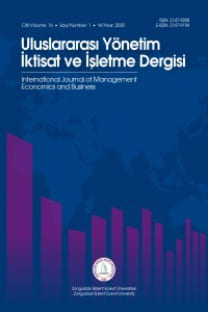TÜRKİYE’NİN NET PETROL İTHALATININ FİYAT VE GELİR ESNEKLİKLERİ: ARDL MODELLEME YAKLAŞIMI İLE EŞBÜTÜNLEŞME ANALİZİ
Bu çalışmada, Türkiye'nin net petrol ithalatının fiyat ve gelir esnekliklerinin tahmin edilmesi amaçlanmıştır. Bunun için, 1970-2010 dönemini kapsayan yıllık veriler kullanılarak ARDL modelleme yaklaşımıyla eşbütünleşme analizi yapılmış ve aynı yaklaşımın hata düzeltme modeli uygulanmıştır. Elde edilen sonuçlara göre net petrol ithalatının gelir esnekliği uzun dönemde 0,67; kısa dönemde 1,11 olarak bulunmuştur. Net petrol ithalatının fiyat esnekliği ise beklenen negatif işarete sahip olmakla birlikte, gerek kısa dönem gerekse uzun dönem için istatiksel olarak anlamlı değildir. Buna göre net petrol ithalatının, kısa ve uzun dönemde petroldeki fiyat değişmelerinden etkilenmediği sonucuna varılabilir.
Anahtar Kelimeler:
Petrol İthalatı, Fiyat ve Gelir Esneklikleri, ARDL Sınır Testi, Eşbütünleşme Analizi, Türkiye
PRICE AND INCOME ELASTICITIES OF NET OIL IMPORTS IN TURKEY: AN ARDL MODELLING APPROACH TO COINTEGRATION ANALYSIS
The aim of this study is to estimate the short-run and the long-run price and income elasticities of net oil imports in Turkey. In order to achieve this objective, the autoregressive distributed lag ARDL modeling approach to cointegration analysis is employed and the error correction model of the same approach is applied by using the annual data of Turkey covering the period of 1970-2010. The estimation results yield that long-run and short-run income elasticities of net oil imports are 0,67 and 1,11 respectively. Although the short-run and long-run price elasticities of net oil imports have the expected negative signs, they have found to be statistically insignificant both in short-run and long-run. Thus, it can be concluded that net oil imports are not affected by the changes in oil prices
Keywords:
Oil Import, Price and Income Elasticities, ARDL Bounds Testing, Cointegration Analysis, Turkey,
___
- Altınay, G. (2007). Short-run and long-run elasticities of import demand for crude oil in Turkey. Energy Policy, 35(11), 5829-5835.
- Cooper, J. C. B. (2003). Price elasticity of demand for crude oil: Estimates for 23 countries. OPEC Review, 27(1), 1-8. Enerji Bakanlığı. Erişim Tarihi: 30.12.2012, http://www.enerji.gov.tr/index.php?dil=tr&sf=webpages&b=y_istatistik&bn=24 4&hn=244&id=398
- Engle, R. F., & Granger, C. W. J. (1987). Cointegration and error correction: representation, estimation and testing. Econometrica, 55(2), 251-276.
- EPDK. (2012). Petrol Piyasası Sektör Raporu. Ankara.
- Gately, D., & Huntington, H. G. (2002). The asymmetric effects of changes in price and income on energy and oil demand. The Energy Journal, 23(1), 19-55.
- Ghosh, S. (2009). Import demand of crude oil and economic growth: Evidence from India. Energy Policy, 37(2), 699-702.
- Örneğin, önceki yıllarda ısınma amaçlı olarak kullanılan petrolün yerini bu gün büyük ölçüde doğal gaz ve kömür almıştır.
- Petrol fiyatlarının artması, büyümeyi frenleyerek petrol tüketimini dolaylı olarak etkilemektedir.
- Granger, C. W. J., & Newbold, P. (1974). Spurious regressions in econometrics. Journal of Econometrics, 2(2), 111-120.
- Halıcıoğlu, F. (2007). Residential electricity demand dynamics in Turkey. Energy Economics, 29(2), 199-210.
- Iwayemi, A., Adenikinju, A., & Babatunde, M. A. (2010). Estimating petroleum products demand elasticities in Nigeria: A multivariate cointegration approach. Energy Economics, 32(1), 73-85.
- Johansen, S. (1988). Statistical analysis of cointegration vectors. Journal of Economic Dynamics and Control, 12(2-3), 231-254.
- Johansen, S., & Juselius, K. (1990). Maximum likelihood estimation and inference on cointegration–with application to the demand for money. Oxford Bulletin of Economics and Statistics, 52(2), 169-210. Kalkınma Bakanlığı. Erişim Tarihi: 30.12.2012, http://www.kalkinma.gov.tr/PortalDesign/PortalControls/WebIcerikGosterim.asp x?Enc=83D5A6FF03C7B4FC5A73E5CFAD2D9676
- Krichene, N. (2002). World crude oil and natural gas: A demand and supply model. Energy Economics, 24(6), 557-576.
- Maden, S., & Baykul, A. (2012). Co-integration analyses of price and income elasticities of electricity power consumption in Turkey. European Journal of Social Sciences, 30(4), 523-534.
- Moore, A. (2011). Demand elasticity of oil in Barbados. Energy Policy, 39(6), 3515- 3519.
- Pesaran, M. H., Shin, Y., & Smith, R. J. (2001), Bounds testing approaches to the analysis of level relationships. Journal of Applied Econometrics, 16(3), 289-326.
- Ramanathan, R. (1999). Short- and long-run elasticities of gasoline demand in India: An empirical analysis using cointegration techniques. Energy Economics, 21(4), 321-330.
- Rao, B. B., & Rao, G. (2009). Cointegration and the demand for gasoline. Energy Policy, 37(10), 3978-3983.
- Sa’ad, S. (2009). An empirical analysis of petroleum demand for Indonesia: An application of the cointegration approach. Energy Policy, 37(11), 4391-4396.
- Sevüktekin, M., & Nargeleçekenler, M. (2010). Ekonometrik zaman serileri analizi. Ankara: Nobel Yayın Dağıtım.
- Türkekul, B., & Unakıtan, G. (2011). A cointegration analysis of the price and income elasticities of energy demand in Turkish agriculture. Energy Policy, 39(5), 2416- 2423.
- Ziramba, E. (2010). Price and income elasticities of crude oil import demand in South Africa: A cointegration analysis. Energy Policy, 38(2), 7844-7849.
- ISSN: 2147-9208
- Başlangıç: 2005
- Yayıncı: Zonguldak Bülent Ecevit Üniversitesi
Sayıdaki Diğer Makaleler
KÜRESELLEŞEN DÜNYA EKONOMİSİ VE IMF’NİN DEĞİŞEN ROLÜ
BAĞIMSIZ DENETİM MALİYETİNİN İŞBİRLİKÇİ OYUN MODELİ YAKLAŞIMIYLA MİNİMİZASYONU
Durmuş ACAR, Hayrettin USUL, Güler F. ÜNAL
KÜRESEL SİVİL TOPLUMA KAVRAMSAL BİR BAKIŞ
Erol USTAAHMETOĞLU, Davut AYGÜN, Mustafa SAVCI
Ali Osman SOLAK, Ahmet BEŞKAYA
Ünsal SIĞRI, Ayşe Pınar DİNÇER
Ürün yerleştirmeye yönelik tüketici tutumlarının pazar bölümlerine göre incelenmesi
